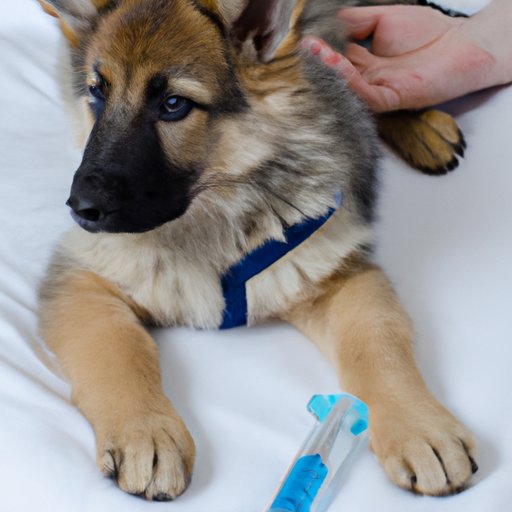Introduction
As a new puppy owner, one of the most important things you can do for your furry companion is to ensure they receive the proper vaccinations. Vaccinations are essential to protect your puppy from deadly diseases, prevent the spread of viruses, and promote a healthy life. In this article, we will provide a detailed guide on how many shots puppies need, when to schedule appointments with your vet, and the benefits of vaccinating your puppy.
Importance of Vaccinations
Vaccinations are crucial for protecting your puppy from infectious diseases. They work by introducing a small amount of a virus or bacteria into your puppy’s body, which then triggers an immune response. This response helps develop immunity to that specific disease so that if your puppy comes into contact with it again, their body will be better equipped to fight it off.
Another benefit of vaccinations is that they promote public health. When enough dogs in a community are vaccinated, it creates herd immunity, which helps protect even unvaccinated dogs from diseases.
There are different types of vaccines, and they are all necessary to ensure your pup stays healthy and strong.
Types of Vaccines
There are two types of vaccines: core and non-core. Core vaccines are necessary for all dogs, regardless of their lifestyle, while non-core vaccines are only necessary for certain dogs based on their lifestyle or exposure risk.
Core vaccines for puppies include:
- Canine distemper virus
- Canine adenovirus
- Canine parvovirus
- Rabies virus
Non-core vaccines for puppies include:
- Bordetella bronchiseptica
- Canine influenza virus
- Leptospira bacteria
Your vet will be able to advise which non-core vaccines your puppy may need based on their specific lifestyle and any potential exposure to those diseases.
Most core vaccines are given in a series of shots to ensure maximum effectiveness.
Age-Based Vaccination Schedule
It’s important to follow a specific vaccination schedule to ensure your puppy receives all the necessary shots at the appropriate time.
For puppies, the typical vaccination schedule is:
- 6-8 weeks old: First dose of distemper, adenovirus, parvovirus
- 10-12 weeks old: Second dose of distemper, adenovirus, parvovirus and first dose of Bordetella and/or influenza
- 14-16 weeks old: Third dose of distemper, adenovirus, parvovirus and second dose of Bordetella and/or influenza.
- 16-18 weeks old: Final dose of Bordetella and/or influenza
- 12-24 weeks old: First dose of leptospirosis (if needed)
- 16-26 weeks old: First dose of rabies
It’s important to keep in mind that some vaccines require more than one shot for maximum effectiveness. Also, depending on your location and local laws, the timing of rabies vaccinations may vary. Always consult with your vet regarding specific schedules and doses.
Risks and Diseases
Failure to vaccinate your puppy could put them at risk of developing serious and potentially deadly diseases. For example, a puppy that has not received the correct parvovirus vaccines may develop parvovirus, which can cause severe vomiting and diarrhea.
Other diseases that can be prevented through vaccinations include distemper, adenovirus, and rabies. All of these diseases can be deadly and are highly contagious.
Health Benefits of Vaccinating
Vaccinations are important not only for your own dog’s health, but for the health of other dogs in your community.
The more dogs that are vaccinated, the less chance there is of a disease spreading. This is known as herd immunity – where a large enough proportion of the population is immune to the disease that it is unlikely to spread.
Vaccinating your puppy can also prevent lifelong health issues, such as seizures and neurological disorders, that can be caused by some of the diseases that vaccines protect against.
Advice for Puppy Owners
If you’re a new puppy owner, it may be overwhelming trying to keep track of your puppy’s vaccinations and appointments. Here are some tips to help make things easier:
- Keep a record of the vaccines your puppy has received. Make sure to bring this record with you to every vet visit.
- Schedule appointments with your vet ahead of time.
- Make sure to keep your puppy away from unvaccinated dogs and areas where other dogs may have eliminated.
- Be aware of any symptoms that may indicate your puppy has been exposed to a disease. Some common symptoms include lethargy, vomiting, diarrhea, coughing, and fever.
It’s important to note that the cost of vaccinations can vary depending on the region, veterinarian, and type of vaccine. However, the cost of vaccinations far outweighs the potential cost of treating a serious illness that could have been prevented with proper vaccination.
Conclusion
As a responsible puppy owner, it is your duty to ensure your furry friend receives all the necessary vaccinations. Proper vaccination helps keep your puppy healthy and happy and prevents the spread of diseases. Follow the advice of your veterinarian and keep up with scheduled vaccinations to help ensure your puppy lives a long and healthy life.
